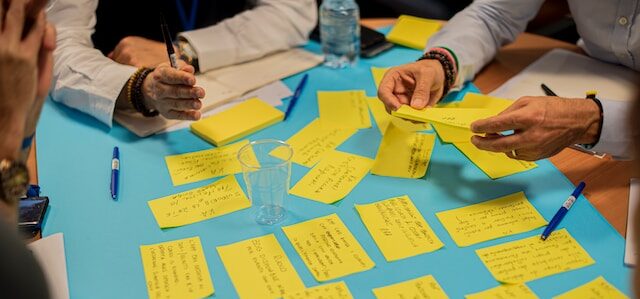The two junior research groups in Social-Ecological Research CIMT and MoveMe held a joint final event showcasing some results of their research into the transition to sustainable mobility. The event took place online on 26. April 2024. More information is available in German.
Category: practitioners
Is that fair? An evaluation tool for local mobility measures
In this article in the journal Internationales Verkehrswesen, Laura Mark, Annika Busch-Geertsema, Jessica LeBris, Gesa Matthes and Kerstin Stark present a practical approach to assess the justice of transport measures in various dimensions. The approach and the article were developed in the context of the working group “Mobilität, Erreichbarkeit und soziale Teilhabe” of the Academy for Spatial Development in the Leibniz Association (ARL).
Summary
This paper presents a practical tool for taking a systematic “second look” at mobility transition measures through the lens of justice. It can be used for conceptual support during planning and implementation, for reflection during or after the process as well as ongoing monitoring. Three dimensions of justice can be used to analyse which population-groups benefit from these measures. The dimensions used are distributive justice, recognition of different realities of life and procedural justice, which have been further differentiated and combined in an easy-to-use matrix.
To differentiate the recognition of different realities of life, the Persona approach is employed. In a Persona, specific characteristics are combined that can influence and restrict mobility options, decisions, and activity chains. The article proposes a system for developing custom Personas, but the Personas already developed by the authors can also be used for the application.
The article provides a detailed presentation of the dimensions of justice and the Persona approach. It can be downloaded here:
Furthermore, the evaluation tool, including a user manual and suggestions for Personas, can also be downloaded in Excel format from the ARL Mobility Working Group website (scroll down). The authors welcome feedback and encourage free use and further development.
Measures for a more user-centered evaluation of classification quality
This paper, presented at the 14th International Conference on Recent Advances in Natural Language Processing, introduces measures to evaluate practical requirements for the usability of AI-based tools.
Summary
A solution to limited annotation budgets is active learning (AL), a collaborative process between humans and machines for the strategic selection of a small but informative set of examples. While current approaches optimize AL from a machine learning perspective, we argue that successful real-world deployment requires additional criteria that target the second pillar of AL: the human annotators and their needs. For example, the usefulness of AL methods in text classification is typically assessed using common performance measures such as accuracy or F1. However, such measures fall short when applied to real-world datasets, which often contain a higher number of imbalanced classes. In these scenarios, additional criteria—such as quickly identifying all classes (e.g., topics) or detecting rare cases—become important. We therefore introduce four measures that reflect the class-specific requirements users have for data collection and content analysis.
In a comprehensive comparison of uncertainty-, diversity-, and hybrid-based data selection strategies across six different datasets, we find, for example, that strong F1 performance does not necessarily correspond to complete class coverage (i.e., not all topics are identified), and that different data selection strategies exhibit varying strengths and weaknesses with respect to class-specific requirements. Our empirical findings highlight that a holistic perspective is essential when evaluating AL approaches to ensure their practical usefulness. To this end, standard measures for evaluating machine-based text classification must be complemented by those that better reflect user needs.
Selected results
- This publication proposes four new class-specific evaluation metrics for AL approaches that take into account how well and how quickly rare or all classes are detected. These criteria are not captured in detail by standard metrics such as F1.
- The new measures enable practice-relevant insights into performance, particularly on datasets with varying frequently occurring classes and a wide range of different classes – characteristics that are common in real-world applications (e.g., topic detection in public participation processes).
- It becomes clear that the choice of an appropriate AL strategy should not be based solely on standard performance measures. For example, the top-performing approaches according to the F1 score may not ensure that all classes are identified, despite this being a crucial requirement in the automated analysis of participation contributions: no topic should be overlooked, no voice should go unheard. The measures we developed can provide additional guidance in strategy selection and thus support the choice of practice-oriented solutions.
Publication
Romberg, J. (2023). Mind the User! Measures to More Accurately Evaluate the Practical Value of Active Learning Strategies. Proceedings of the 14th International Conference on Recent Advances in Natural Language Processing, 996–1006. https://aclanthology.org/2023.ranlp-1.107/
Expert evidence: State of research on opportunities, challenges and limitations of digital participation
As set out in the German Site Selection Act (StandAG), the Federal Office for the Safety of Nuclear Waste Management (BASE) is charged with the comprehensive information and participation of the public in regards procedure for the search and selection of a repository site for the final disposal of high-level radioactive waste. In this context, in February 2022 BASE commissioned an expert report on the “Possibilities and limits of digital participation tools for public participation in the repository site selection procedure (DigiBeSt)” from the Düsseldorf Institute for Internet and Democracy (DIID) at Heinrich Heine University Düsseldorf in cooperation with the nexus Institute Berlin. For this purpose, lead by Tobias Escher a review of the state of research and current developments (work package 2) was prepared has been summarised in a detailed report (in German).
Selected findings from the report are:
- Social inequalities in digital participation are mainly based on the second-level digital divide, i.e. differences in the media- and content-related skills required for independent and constructive use of the internet for political participation.
- Knowledge about the effectiveness of activation factors is still often incomplete and anecdotal, making it difficult for initiators to estimate the costs and benefits of individual measures.
- Personal invitations have been proven to be suitable for (target group-specific) mobilisation, but the established mass media also continue to play an important role.
- Broad and inclusive participation requires a combination of different digital and analogue participation formats.
- Participation formats at the national level face particular challenges due to the complexity of the issues at stake and the size of the target group. Therefore, these require the implementation of cascaded procedures (interlocking formats of participation at different political levels) as well as the creation of new institutions.
Publication
Lütters, Stefanie; Escher, Tobias; Soßdorf, Anna; Gerl, Katharina; Haas, Claudia; Bosch, Claudia (2024): Möglichkeiten und Grenzen digitaler Beteiligungsinstrumente für die Beteiligung der Öffentlichkeit im Standortauswahlverfahren (DigiBeSt). Hg. v. Düsseldorfer Institut für Internet und Demokratie und nexus Institut. Bundesamt für die Sicherheit der nuklearen Entsorgung (BASE). Berlin (BASE-RESFOR 026/24). Available online https://www.base.bund.de/DE/themen/fa/sozio/projekte-ende/projekte-ende.html .
CAIS Working Group: AI in digital public participation
As participants in a workshop organised by the Center for Advanced Internet Studies (CAIS) in Bochum, Julia Romberg and Tobias Escher presented results of the CIMT research on AI-supported evaluation of participation contributions and discussed further possibilities for using artificial intelligence to support public participation with experts from research as well as participation practice. It became clear that the practitioners see potential not only in the evaluation (output), but also in the activation of participants (input) and in the support of interactions (throughput) in participation processes. Nevertheless, these potentials face challenges and risks, including the adequate technical implementation and ensuring data protection and non-discrimination.
The workshop was organised by Dr Dennis Frieß and Anke Stoll and took place from 8 to 10 February 2023 in Bochum. Further information can be found on the website of the Düsseldorf Institute for Internet and Democracy.
3rd workshop for practitioners on first results from surveys in case study municipalities
On 30 November we invited representatives of the municipalities with whom we cooperate in order to discuss the first results of the extensive surveys conducted by our research group. The focus was on the question of how the respective participation procedures are assessed by those participating and which aspects motivate or discourage such participation.
Despite the diversity of the five projects we examined (and the still small number of participants), the assessments of the people participating in such processes show a relatively high degree of agreement. Overall, the evaluations of the participation processes are rather positive with regard to the course of discussion and transparency. At the same time, however, there are also comparable challenges in all processes. For example, the representation of one’s own interests is rated as relatively good, but gaps in the representation of other opinions are perceived. Also, a balance of interests is not always achieved. Furthermore, the participants are rather sceptical about the actual impact of the participation results on the political process, even though they still deem such an impact possible.
There is more information available in German.
2nd workshop for practitioners on automated text analysis for citizen contributions
Part of the efforts of the research group is to develop tools that support the evaluation of citizen contributions from participation processes. On 10 December 2021 the research group hosted a workshop with practitioners (including local planning officials, participation officers and planning experts) to discuss our recent developments, part of which have been published in the Proceedings of the 8th Workshop on Argument Mining.
More information on the insights from the workshop is available in German.
New working group on mobility, accessibility and social inclusion at the ARL – Academy for Territorial Development in the Leibniz Association
We are pleased that Laura Mark is part of the aforementioned working group and can discuss our research with colleagues. Practitioners and researchers meet regularly in the working group to discuss various topics related to mobility and social inclusion. The working group started in the middle of 2021 and the content-related work is now taking more and more shape: Areas of interface with our research include the question of procedural justice in planning processes for the mobility transition – who participates and whose voices are heard? How should planning and participation processes for a sustainable mobility transition be designed in the future in order to include everyone? Here we will report on the further work and publications and events that develop within the context of this working group!
Results of the first practical workshop of the junior research group CIMT
Our first practical workshop in summer 2020 focused on the question of how the evaluation of citizen contributions can be technically supported and what requirements practitioners have for a software solution designed to (partially) automate the evaluation.
More information can be found in the working paper (German version only!):




